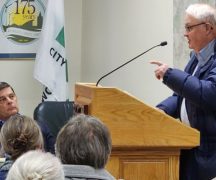The revised zoning code, soon to be passed by City Council, is now posted online. BG residents should consider how proposed changes will affect us all.
It is sad that a narrative of homeowner vs renter is dividing residents who share so many interests. Values of historic preservation, the need for starter homes, drainage and parking issues, and irresponsible landlords, all become irrelevant. Instead, advocates of the PR insist bigoted homeowners — only 35 percent of BG residents, and far less in some areas — are the ones harming our city.
On moving to BG, I saved money by washing diapers on the unheated back porch of a Summit Street apartment. One starting salary at BGSU came to less than two graduate assistanceships, so it was hard making down payment on a house.
Understanding what tenants go through to realize the dream of decent housing, I reject misguided claims that those who met this struggle years ago are bigoted against our neighbors who happen to rent. Do PR advocates consider that all existing rentals and businesses will be grandfathered under any new zoning code? No one is forcing tenants out (except, sometimes, their landlords).
Right now, there are renters on every block of the PR, although some no longer have any owner-occupied homes. On my block there are two duplexes and numerous apartments around all corners. Have there been racist or classist attempts to persecute these tenants and expel them? None that I’ve heard of in the past 40 years.
I also question the claim that breaking existing homes into multiple units will enable younger people to join the privileged ranks of owners. After conversations with friends who divided their homes years ago, I’m convinced this is not a serious solution to the housing crisis. It may prove helpful for the few who start out with plenty of capital, but my friends dealt with overwhelming problems until they felt forced to sell.
Are significant numbers of first-time buyers eager to take out an extra loan to install a second kitchen, maybe bathrooms as well, and become resident landlords? Isn’t it more likely investors will snap up and convert houses, never setting foot in the neighborhood or caring about proper upkeep — an undeniable problem all over BG.
Once upon a time, young and old, owners and tenants, tried to make common cause. Who is pushing the divisive narrative? Who will profit from greater than 65 percent rentals across our town? It is a fantasy that renters will fare better in a PR, just as it’s false that homeowners are bigoted against them.
Anesa Miller
Bowling Green



